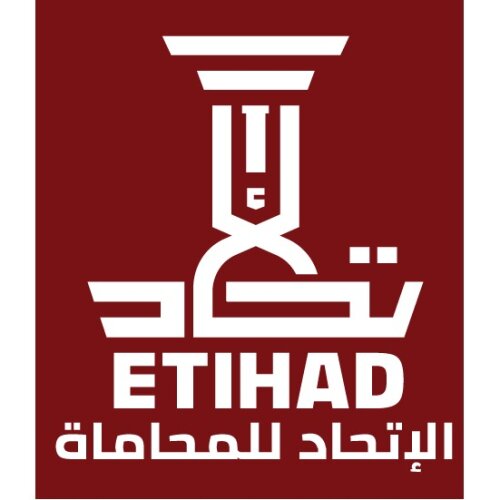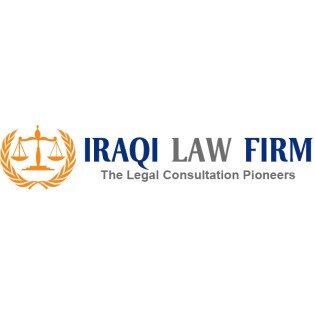Best Tax Increment Financing Lawyers in Iraq
Share your needs with us, get contacted by law firms.
Free. Takes 2 min.
Or refine your search by selecting a city:
List of the best lawyers in Iraq
About Tax Increment Financing Law in Iraq
Tax Increment Financing (TIF) is a tool used by governments to encourage economic development and community improvement. In Iraq, TIF is relatively new and developing as a method to finance infrastructure investments and urban redevelopment projects. The principle behind TIF in Iraq is to leverage future gains in taxes to subsidize current improvements, which are expected to create conditions conducive to community growth and project-specific development. While still gaining traction, TIF represents a significant opportunity for revitalizing underdeveloped areas and fostering economic resilience in urban zones.
Why You May Need a Lawyer
Navigating the complexities of TIF can be daunting for individuals and organizations unfamiliar with legal and financial intricacies. Common situations where you may need legal assistance include:
- Understanding the eligibility criteria for initiating or participating in a TIF district.
- Assessing the long-term financial implications and benefits of a TIF project.
- Negotiating with local governments or developers over project terms or agreements.
- Ensuring compliance with relevant local and national regulations governing TIF.
- Resolving any disputes arising from TIF agreements or project implementations.
Engaging a lawyer can help safeguard your interests in such complexities, ensuring that all legal and regulatory requirements are met efficiently.
Local Laws Overview
The legislative framework pertaining to TIF in Iraq is evolving. However, key aspects of local laws include:
- Defining the geographical limits and types of projects eligible for TIF-based financing.
- Setting rules for establishing a TIF district, including the procedures for approval and public participation.
- Regulating how incremental tax revenue is calculated, allocated, and used in relation to project costs.
- Informing development benchmarks and requirements to ensure community and environmental standards are maintained.
- Mandating transparency and accountability mechanisms to ensure proper oversight and auditing of TIF funds.
Understanding these aspects is crucial, as they form the basis for TIF project planning and execution within Iraqi jurisdictions.
Frequently Asked Questions
What is Tax Increment Financing?
Tax Increment Financing (TIF) is a public financing method used to subsidize community development projects by using future tax revenues anticipated as a result of the project itself.
How does TIF benefit a community in Iraq?
TIF encourages redevelopment in areas that would otherwise not attract private investment, thus enhancing economic growth, job creation, and local infrastructure improvements.
Who can apply for a TIF in Iraq?
Applications typically involve local governments or authorized developers subject to criteria outlined in national and local regulations.
What types of projects are eligible for TIF support?
Projects focusing on infrastructure, urban renewal, community facilities, and other developments fostering economic growth and public welfare may be eligible for TIF support.
How is a TIF district created?
A TIF district is established through a legal process involving assessment, designation, and approval from relevant governmental authorities.
What risks are associated with TIF?
Risks can include projected revenue shortfalls, delays in development, legal disputes over project terms, and broader economic fluctuations affecting viability.
How are TIF funds distributed?
Funds collected through tax increments are distributed to finance overall project costs and repay debts incurred for development efforts within the TIF area.
What legal documents are needed for a TIF application?
Commonly required documents include feasibility studies, legal agreements, financial plans, and compliance certifications with applicable regulations.
What role does public involvement play in TIF projects?
Public consultations and hearings often form part of the TIF process, ensuring transparency and community engagement in development planning.
Can a TIF project be modified or terminated?
Changes to or termination of a TIF project may occur through negotiation and legal amendment procedures based on compliance with existing contractual and regulatory provisions.
Additional Resources
For further information and assistance with TIF matters in Iraq, consider reaching out to:
- The Ministry of Construction, Housing, Municipalities and Public Works for policy guidelines and applications.
- The National Investment Commission for potential investment incentives and support frameworks.
- Local Chambers of Commerce for advice and networking with relevant stakeholders.
- Professional legal and financial advisors specializing in public financing and urban development.
Next Steps
If you find yourself needing legal assistance with regard to Tax Increment Financing in Iraq, consider the following steps:
- Consult with a lawyer specializing in public finance and urban development to clarify your specific needs and legal options.
- Gather all necessary documentation and conduct preliminary research about the TIF process relevant to your interests.
- Schedule meetings with local government officials or agencies knowledgeable about TIF projects to better understand regulatory expectations.
- If required, engage in stakeholder discussions to align project objectives with community and development goals.
Taking these proactive steps can help ensure smooth navigation through the legal intricacies of Tax Increment Financing in Iraq.
Lawzana helps you find the best lawyers and law firms in Iraq through a curated and pre-screened list of qualified legal professionals. Our platform offers rankings and detailed profiles of attorneys and law firms, allowing you to compare based on practice areas, including Tax Increment Financing, experience, and client feedback.
Each profile includes a description of the firm's areas of practice, client reviews, team members and partners, year of establishment, spoken languages, office locations, contact information, social media presence, and any published articles or resources. Most firms on our platform speak English and are experienced in both local and international legal matters.
Get a quote from top-rated law firms in Iraq — quickly, securely, and without unnecessary hassle.
Disclaimer:
The information provided on this page is for general informational purposes only and does not constitute legal advice. While we strive to ensure the accuracy and relevance of the content, legal information may change over time, and interpretations of the law can vary. You should always consult with a qualified legal professional for advice specific to your situation.
We disclaim all liability for actions taken or not taken based on the content of this page. If you believe any information is incorrect or outdated, please contact us, and we will review and update it where appropriate.
Browse tax increment financing law firms by city in Iraq
Refine your search by selecting a city.

















